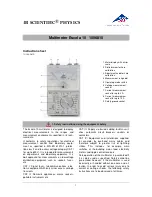
Operating Instructions
Model MM42
Digital Multimeter
SAFETY INFORMATION
The following safety information must be observed
to ensure maximum personal safety during the
operation of this meter:
Do not use the meter if the meter or test leads look
damaged, or if you suspect that the meter is not
operating properly.
Never ground yourself when taking electrical
measurements. Do not touch exposed metal pipes,
outlets, fixtures, etc, which might be at ground
potential. Keep your body isolated from ground by
using dry clothing, rubber shoes, rubber mats, or
any insulating material.
Turn off power to the circuit under test before
cutting, unsoldering, or breaking the circuit. Small
amounts of current could be dangerous.
Use caution when working above 30V AC rms or
60V DC. Such voltages pose a shock hazard.
When using the probes, keep your fingers behind
the finger guards on the probes.
MM42 REV3 7/05
NOTE
This instrument is only to be used by a suitably
trained and competent person.
The symbols used on this instrument are:
Measuring voltage which exceeds the limits of the
multimeter may damage the meter and expose the
operator to a shock hazard. Always recognise the meter
voltage limits as stated on the front of the meter.
HIGH ENERGY SYSTEMS
GS38 advises fused test leads to be used when
working on high energy systems. Suitable leads are
Martindale TL55.
SPECIFICATIONS
Display: 3½ digit liquid crystal display (LCD) with a
maximum reading of 1999.
Polarity: Automatic, positive implied, negative
polarity indication.
Overrange: (1) or (-1) is displayed.
Zero: automatic.
Low Battery Indication: The
is displayed when
the battery voltage drops below the operating level.
Measurement rate: 2.5 times per second, nominal.
Operating environment: 0°C to 50°C at < 70% R.H.
Storage temperature: -20°C to 60°C, 0 to 80% R.H.
with battery removed from meter.
Installation Categories: Category III: Fixed wiring
and installations within a building.
Accuracy: Stated accuracy at 23°C ± 5°C, < 75% R.H.
Battery life: 300 hours typical with carbon-zinc.
Battery: Single standard 9-volt battery, NEDA 1604,
JIS 006P, IEC 6F22, PP3.
Dimensions: 147mm (H)x 70mm (W)x 39mm (D).
Weight: Approx. 340g including battery and holster.
Accessories: One pair test leads, One spare fuse, 9V
battery (installed) and Operating Instructions.
DC VOLTS
Ranges: 2V, 20V, 200V, 600V
Resolution: 1mV (on 2V range)
Accuracy: ± (1.2% rdg + 1 dgt)
Input impedance: 1M
Ω
Overload protection: 600VDC or AC rms
AC VOLTS: (50Hz - 500Hz)
Ranges: 200V, 600V
Resolution: 100mV (on 200mV range)
Accuracy: ± (2.0% rdg + 4 dgts)
Input impedance: 450k
Ω
Overload protection: 600V DC or AC rms
DC CURRENT
Ranges: 2A
Resolution: 1mA
Accuracy: ± (2.5% rdg + 2 dgts)
Input protection: 2A/600V fast blow ceramic fuse
RESISTANCE
Ranges: 200
Ω
, 2k
Ω
, 20k
Ω
, 200k
Ω
, 2000k
Ω
Resolution: 100m
Ω
(on 200
Ω
range)
Accuracy: ± (1.5% rdg + 3 dgts) on 200
Ω
range
± (1.5% rdg + 1 dgt) on 2k
Ω
to 2000k
Ω
ranges
Open Circuit volts: 0.3V DC (3.0V DC on 200
Ω
range)
Overload Protection: 500V DC or AC rms
DIODE TEST
Test current: 1.0mA ± 0.6mA
Accuracy: ± (3.0% rdg + 1 dgt)
Open circuit volts: 3.3V DC typical
Overload protection: 500V DC or AC rms
TRANSISTOR hFE
Ranges: 0 - 1000
Base current: 10µA DC approx. (Vce = 3.0V DC)
BATTERY TEST
Ranges: 1.5V, 9V
Resolution: 1mV, 10mV
Accuracy: ± (3.0% rdg + 2 dgts)
Loaded Current:150mA typical for 1.5V range
6mA typical for 9V range
Caution, risk of electric shock
Caution, refer to accompanying
documents
Equipment protected throughout
by Double Insulation (Class II)
Alternating current
Direct current
Ground
z
~
The instrument meets the requirements for double
insulation to BS EN 61010-1 at 600V Installation
Category
III
. Installation Category
III
(distribution
level) relates to transient overvoltage likely to be
found in fixed installation wiring.



















